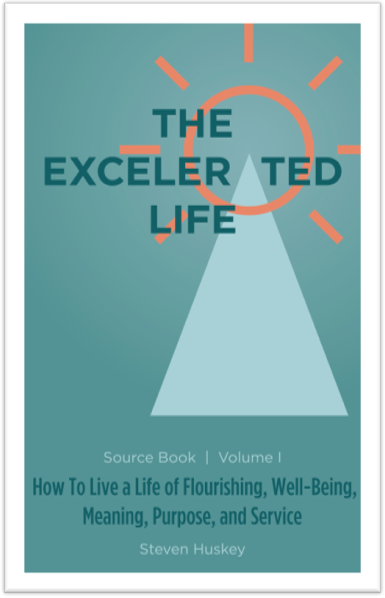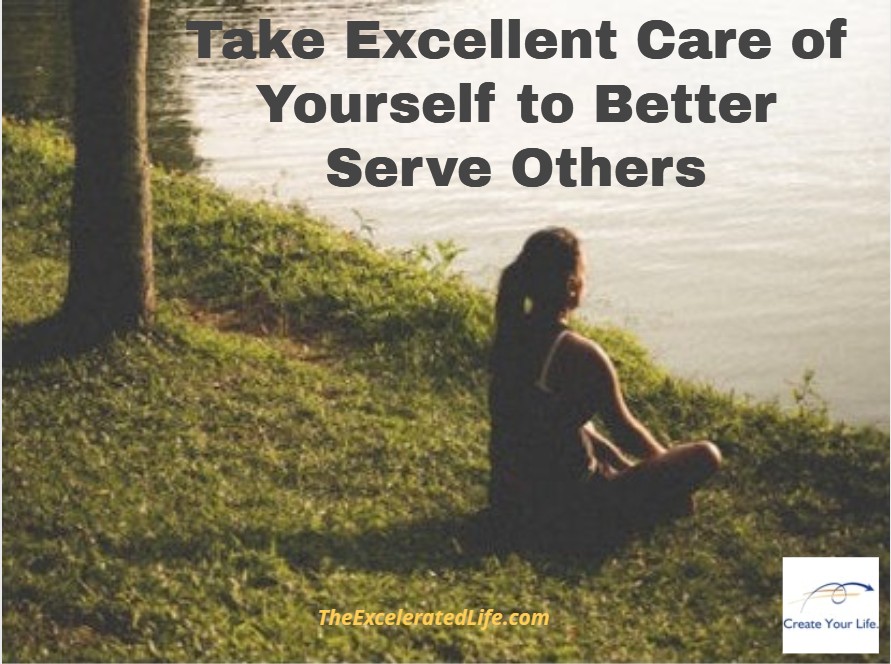Selffulness doesn’t mean neglecting others. It’s creating a balance where you’re able to give from a place of abundance rather than depletion so you can take care of yourself and others.
The Self-Care Misunderstanding
Self-care has gotten a bad reputation over the years. For some, it’s seen as indulgent, unnecessary, or even “selfish.” But when our daughter was stricken with a debilitating stroke, my wife and I quickly learned that the only way to be effective in caring for her was to also take care of ourselves.
You’ve heard this before, but let me say it again: the advice to “put your oxygen mask on first” is more than just a cliché. When you’re under great stress—whether caring for a loved one or just trying to get through the day-to-day grind—taking care of yourself is essential. If you let yourself get run down, you’re no good to the people who rely on you.

And that’s at the heart of Excelerated Selffulness™. It involves taking extremely good care of yourself; not because you’re selfish, but because it allows you to show up and serve others in the most effective way possible. Remember: you cannot give away what you do not have.
Let’s break down this idea by contrasting three ways of living: selfish, selfless, and selfful.
Selfishness: Putting Your Needs First at the Expense of Others
When we think of selfishness, we often think of someone who is entirely focused on their own needs and desires, with little regard for others. This type of person prioritizes their own wants over everything else, often leaving those around them feeling unsupported or neglected.
Think about time: a selfish person is someone who rarely, if ever, gives their time to help others unless they believe they’ll get something in return. They’re the ones who always take but never give back. At work, they may seek recognition and accolades but are quick to blame others when things go wrong. At home, they may demand attention but fail to meet the emotional needs of their family members.
In terms of money, a selfish person might hoard resources, viewing life as a zero-sum game. Any act of generosity is calculated to benefit them somehow, perhaps to elevate their status or seek favor. Giving is not something they do freely—it’s a means to an end.
Now, think for a moment: Can you recall a time when you’ve been overly focused on your own needs at the expense of others? How did it affect your relationships? Did it bring long-term fulfillment, or did it isolate you from those you care about?
The truth is, selfishness doesn’t lead to lasting happiness. Sure, in the short term, it may seem easier to focus only on yourself. But in the long run, it leads to isolation and resentment from others. No one wants to feel used or neglected, and eventually, selfish behavior drives a wedge between you and the people you need most in life.
Selflessness: Putting Everyone Else First (And Yourself Last)
On the opposite end of the spectrum is selflessness—constantly putting the needs of others ahead of your own. At first glance, selflessness might seem virtuous. After all, aren’t we taught to think of others before ourselves?
But the problem with always putting yourself last is that it leads to burnout, resentment, and even health problems. When you’re constantly giving without replenishing your own energy or meeting your own needs, you’re like a car running on empty. Sooner or later, you’ll stall out.
Caregivers are a prime example of this. Many caregivers neglect their own health or well-being in favor of taking care of others. They may skip meals, ignore doctor’s appointments, or sacrifice sleep, all in the name of helping someone else. And while their intentions are noble, they often find themselves completely depleted, unable to give the care they want to provide.
Think about your own life. Have you ever found yourself sacrificing your own well-being to serve others? What were the results? Did you feel fulfilled, or did you feel drained, perhaps even resentful?
Societal pressure to be selfless is particularly strong in certain groups, including mothers, caregivers, and healthcare workers. These individuals are often expected to give tirelessly, even at the expense of their health. But this approach isn’t sustainable. It may work in the short term, but it ultimately leads to a diminished capacity to care for others, as well as emotional exhaustion.
Selffulness: Taking Care of Yourself to Better Serve Others
A better choice is selffulness. This concept is about taking care of your own needs, not at the expense of others, but in service of them. When you’re selfful, you ensure that your tank is full so you have the energy, mental clarity, and emotional reserves to give to others.
Selffulness is different from selfishness because it’s not about ignoring others. It’s creating a balance where your own needs are met, so you’re better equipped to serve others. On the other hand, it’s different from selflessness because you’re not neglecting yourself or martyring yourself for the sake of others. Instead, you’re finding a healthy balance between giving and receiving.
Take, for example, a parent who prioritizes their own rest and health so they can better nurture their children. When they’re well-rested, they’re more patient, more present, and more capable of providing the care their children need. Or a leader who takes time for self-care so they can be more focused and effective at work. These individuals understand that self-care isn’t indulgent. It’s essential.
Take a moment to reflect: What areas of your life might improve if you dedicated more time to taking care of yourself? How might this benefit the people around you?

Why Selffulness Is Essential for Flourishing
The concept of selffulness isn’t just about maintaining basic health; it’s about flourishing. When your needs are met—when you’re well-rested, nourished, and mentally clear—you can show up as the best version of yourself. And when you show up as your best self, everyone benefits.
Mental and emotional well-being: When you take care of your mental health, you have more patience, more energy, and more emotional resilience. You’re better equipped to handle stress, solve problems, and support others.
Physical health: If you neglect your physical health, you run the risk of getting sick or burned out. And when that happens, you’re no longer able to care for others. For example, a healthcare professional who skips their own doctor’s appointments because they’re “too busy” helping others might eventually find themselves unable to work due to illness.
Relationships and boundaries: Selffulness also means setting boundaries. Sometimes, the most selfful thing you can do is say “no.” By doing so, you protect your energy and time, ensuring you can say “yes” when it really matters.
So, ask yourself: What would change in your life if you tended to your own needs more diligently? How would this impact your ability to care for others?
How to Practice Selffulness
So, how do you start practicing selffulness?
Step 1: Identify Your Core Needs
Begin by identifying your core needs, those non-negotiables that help you feel well cared for. Maybe you need 8 hours of sleep, or maybe you need quiet time in the morning to reflect. Whatever your needs are, write them down.
What are your non-negotiables for feeling well cared for?
Step 2: Set Boundaries and Protect Your Time
Next, protect your time by setting clear boundaries. Don’t be afraid to say “no” to things that drain your energy. And don’t be afraid to ask for help when you need it.
What are you currently saying “yes” to that is draining you?
Step 3: Schedule Self-Care
Finally, make self-care a priority by scheduling it into your daily life. Whether it’s taking a 10-minute walk or meditating for a few minutes each morning, find small, actionable ways to take care of yourself.
How can you incorporate small moments of selffulness into your daily routine?
Balancing Selffulness with Service to Others
Remember, selffulness doesn’t mean neglecting others. It’s creating a balance where you’re able to give from a place of abundance rather than depletion.
When you take care of yourself, everyone benefits. A leader who prioritizes self-care is more focused and effective. A parent who gets adequate rest is more patient and nurturing. By taking care of yourself, you’re actually in a better position to give.
How do you feel when you are rested, energized, and in a positive state of mind? How does this impact your ability to give to others?
Embracing Selffulness for an Excelerated Life™
Taking care of yourself is not selfish. It’s essential. Excelerated Selffulness™ is giving yourself the care you need so that you can show up as the best version of yourself. Because when you do, everyone benefits.
So, over to you: What will you commit to today to become more selfful? What small change can you make that will help you take better care of yourself, so you can better serve others? That is the next step to your Excelerated Life™!
Leave a comment below and share one thing you will do today to prioritize your own self-care. Let’s start a conversation about how we can all practice selffulness to live more fulfilling, balanced lives.
Excelerated Selffulness™ — taking excellent care of yourself — is one practice for creating your Excelerated Life™, a life of flourishing and well-being, and a life of meaning, purpose, and service
Read more about the Excelerated Life™ .
This blog post includes research information provided by ChatGPT, an AI language model developed by OpenAI. Please note that the suggestions are not official statements from OpenAI. To learn more about ChatGPT and its capabilities, you can visit the OpenAI website.


